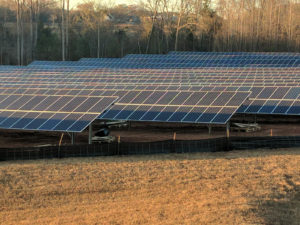
For textile manufacturers that operate energy-intensive machinery, solar-generated energy provides a way to save on energy bills and reduce carbon footprint. Glen Raven Custom Fabrics LLC, best known as the makers of Sunbrella® fabrics, recently debuted a 3,076-panel solar array at its flagship manufacturing facility in Anderson, S.C.
The one-megawatt project was designed to power 100 percent of the lighting at the facility. The Anderson plant produces high-end Sunbrella fabrics for outdoor furniture as well as more traditional products such as marine awning and shades. The facility is also home to the company’s many research and development programs.
The array was built in partnership with Atlanta, Ga.-based Hannah Solar, a leading solar integrator of commercial and residential solar displays. It is the largest privately-owned solar panel in South Carolina that is not funded through an energy company.
This isn’t Glen Raven’s first foray into solar power—its yarn spinning plant in Norlina, N.C., has a rooftop solar array that is about half the size of Anderson’s, something that gave the company the confidence to move forward on the Anderson project.
Edmund Gant III, a Glen Raven process engineer who led the development of the solar array project, says solar power is part of an overarching environmental initiative at Glen Raven to institute sustainability programs that lessen environmental impact. All of Glen Raven’s facilities are landfill-free, which means no waste is produced. The Anderson plant has also reduced water consumption by 10 million gallons annually.
Energy is one of the primary cost factors in the textile industry, so improving energy efficiency is an important concern for textile plants. Though cost can vary, based on factors such as location and available sunlight hours, top commercial provider First Solar has stated that the cost per watt for solar installations at this scale is around $1 per watt. A one-megawatt solar farm would cost roughly $1 million to install. Glen Raven’s total cost was $2 million for the entirety of the project, from grading to turnkey.
Despite the substantial cost at the onset, energy-efficiency investment is a sound business strategy in today’s manufacturing environment. Glen Raven also participates in Duke Energy’s solar rebate program, which provides $1 per watt for business customers who install systems up to one megawatt on their property in the state of South Carolina.
And there’s likely more sustainable practices to come. “I would love to see Glen Raven have a renewable energy source in every location in our manufacturing fleet, but we have to evaluate the costs and return on investment,” says Gant. “Hopefully in the future, we’ll find additional opportunities—whether it’s solar, wind, hydro, wind, steam, or anything else we can do—to have a better impact on the environment.”
Jahna Peloquin is a writer and editor based in Minneapolis, Minn.
 TEXTILES.ORG
TEXTILES.ORG


